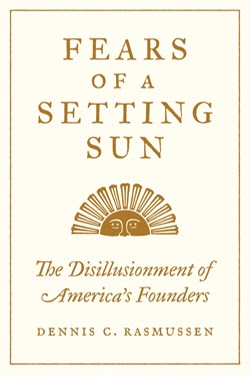full-time faculty teaching and conducting research in political science
of Maxwell faculty conduct research focused outside of the U.S.
graduate students in residence; fewer than 12 admitted each year
Undergraduate Studies
Graduate Studies

I am Maxwell.
Civic engagement is a core value for me. I have always aspired to help the communities I’m from.” Mazaher Kaila, a Maxwell alumna and third-year student at Syracuse University's College of Law, moved with her family from Sudan to Central New York when she was four years old. “I realized that to make meaningful change in society, I needed to understand the systems that power it—government and politics—and that’s insight I would gain by studying political science.”
Mazaher Kaila ’19, L’22
political science, law
Fears of a Setting Sun: The Disillusionment of America's Founders
Dennis C. Rasmussen
Princeton University Press, June 2021

In his new book, “Fears of a Setting Sun: The Disillusionment of America’s Founders” (Princeton University Press), Syracuse political science professor Dennis Rasmussen examines why many of America’s founding fathers—George Washington, John Adams, and Thomas Jefferson, to name a few—were concerned about America’s future. Today, it seems as if many of their greatest fears have been realized.
In today’s political climate, George Washington’s fear of hyper-partisanship dividing the country is, sadly, a reality. Whether it’s the public voting in general elections or the House or Senate voting on bills to become law, the contrast by party lines has never been clearer. John Adams too was right: the lack of civic engagement is a perennial complaint in America. Thomas Jefferson wasn't wrong, either: his fear of slavery dividing the United States by region came true during the American Civil War. Rasmussen hopes that highlighting the founders’ concerns about America’s future will illustrate how historical quarrels shed light on our present political climate. Today’s political turmoil, Rasmussen explains, is reminiscent of America’s early days.
Rasmussen is a professor of political science at the Maxwell School of Citizenship and Public Affairs. His research interests focus on the American founding and Enlightenment political thought. He earned a Ph.D. from Duke University in 2005 and a B.A. from Michigan State University’s James Madison College in 2000. He previously authored “The Infidel and the Professor: David Hume, Adam Smith, and the Friendship That Shaped Modern Thought” (Princeton University Press, 2017), which was shortlisted for the Ralph Waldo Emerson Award and named one of the Guardian’s and the Australian Book Review’s best books of 2017.
Publisher’s Description
Americans seldom deify Founding Fathers any longer, but they do still tend to venerate the Constitution and the republican government that the founders created. Strikingly, the founders themselves were far less confident in what they had wrought, particularly by the end of their lives. In fact, most of them—including former President George Washington, Alexander Hamilton, former President John Adams, and former President Thomas Jefferson—came to deem America’s constitutional experiment an utter failure that was unlikely to last beyond their own generation.
"Fears of a Setting Sun" is the first book to tell the fascinating and too-little-known story of the founders’ disillusionment. As Professor Dennis Rasmussen shows, the founders’ pessimism had a variety of sources: Washington lost his faith in America’s political system above all because of the rise of partisanship, Hamilton because he felt that the federal government was too weak, Adams because he believed that the people lacked civic virtue, and Jefferson because of sectional divisions laid bare by the spread of slavery.
The one major founder who retained his faith in America’s constitutional order to the end was James Madison, and the book also explores why he remained relatively optimistic when so many of his compatriots did not. As much as Americans today may worry about their country’s future, Rasmussen reveals, the founders faced even graver problems and harbored even deeper misgivings. A vividly written account of a chapter of American history that has received too little attention, "Fears of a Setting Sun" will change the way that you look at the American founding, the Constitution, and indeed the United States itself.
Related News
Commentary

Aug 1, 2024
Commentary

Jul 31, 2024
Commentary

Jul 30, 2024
BaoBao Zhang Joins First Cohort of AI2050 Early Career Fellows
One of only 15 scholars chosen from across the U.S., Zhang will receive up to $200,000 in research funding over the next two years. Zhang will use the funding to partner with the nonprofit, non-partisan Center for New Democratic Processes to test whether public participation in AI governance is increased through the creation of public assemblies, known as “deliberative democracy workshops.”
Baobao Zhang
Assistant Professor, Political Science Department

Fears of a Setting Sun: The Disillusionment of America's Founders
Dennis C. Rasmussen
Princeton University Press, June 2021

In his new book, “Fears of a Setting Sun: The Disillusionment of America’s Founders” (Princeton University Press), Syracuse political science professor Dennis Rasmussen examines why many of America’s founding fathers—George Washington, John Adams, and Thomas Jefferson, to name a few—were concerned about America’s future. Today, it seems as if many of their greatest fears have been realized.
In today’s political climate, George Washington’s fear of hyper-partisanship dividing the country is, sadly, a reality. Whether it’s the public voting in general elections or the House or Senate voting on bills to become law, the contrast by party lines has never been clearer. John Adams too was right: the lack of civic engagement is a perennial complaint in America. Thomas Jefferson wasn't wrong, either: his fear of slavery dividing the United States by region came true during the American Civil War. Rasmussen hopes that highlighting the founders’ concerns about America’s future will illustrate how historical quarrels shed light on our present political climate. Today’s political turmoil, Rasmussen explains, is reminiscent of America’s early days.
Rasmussen is a professor of political science at the Maxwell School of Citizenship and Public Affairs. His research interests focus on the American founding and Enlightenment political thought. He earned a Ph.D. from Duke University in 2005 and a B.A. from Michigan State University’s James Madison College in 2000. He previously authored “The Infidel and the Professor: David Hume, Adam Smith, and the Friendship That Shaped Modern Thought” (Princeton University Press, 2017), which was shortlisted for the Ralph Waldo Emerson Award and named one of the Guardian’s and the Australian Book Review’s best books of 2017.
Publisher’s Description
Americans seldom deify Founding Fathers any longer, but they do still tend to venerate the Constitution and the republican government that the founders created. Strikingly, the founders themselves were far less confident in what they had wrought, particularly by the end of their lives. In fact, most of them—including former President George Washington, Alexander Hamilton, former President John Adams, and former President Thomas Jefferson—came to deem America’s constitutional experiment an utter failure that was unlikely to last beyond their own generation.
"Fears of a Setting Sun" is the first book to tell the fascinating and too-little-known story of the founders’ disillusionment. As Professor Dennis Rasmussen shows, the founders’ pessimism had a variety of sources: Washington lost his faith in America’s political system above all because of the rise of partisanship, Hamilton because he felt that the federal government was too weak, Adams because he believed that the people lacked civic virtue, and Jefferson because of sectional divisions laid bare by the spread of slavery.
The one major founder who retained his faith in America’s constitutional order to the end was James Madison, and the book also explores why he remained relatively optimistic when so many of his compatriots did not. As much as Americans today may worry about their country’s future, Rasmussen reveals, the founders faced even graver problems and harbored even deeper misgivings. A vividly written account of a chapter of American history that has received too little attention, "Fears of a Setting Sun" will change the way that you look at the American founding, the Constitution, and indeed the United States itself.
Related News
Commentary

Aug 1, 2024
Commentary

Jul 31, 2024
Commentary

Jul 30, 2024
